Do you find yourself at a time when you are anxious or sad? Do you feel like you can’t keep up with modern life? Are the things you have to do overwhelming you? And maybe you can’t even sleep at night?
This is absolutely normal.
Today’s society demands of us rhythms, between work, leisure and private life, that very often require more energy than we are able to give. And it seems that there is never enough time to rest.
Perhaps you experience stress at work or in the family, or you feel a malaise that you are not sure where it comes from. This makes you live badly during the day and also at night, the only time when you would like to take your head off and find some peace.
And you wonder if there is a way to feel better.
We are here to give you good news: there is a solution to this state that can help you feel happier during the day and more relaxed at night.
Have you ever heard of the properties of tryptophan?
Maybe not, but you surely have heard of serotonin, the famous ‘feel-good hormone’.
Well, tryptophan is a compound that stimulates the production of serotonin, responsible for your mood, and melatonin, responsible for the quality of your sleep.
If you don’t know them yet, find out with us what the properties of tryptophan are and how they can help you achieve your well-being.
-
Product on sale
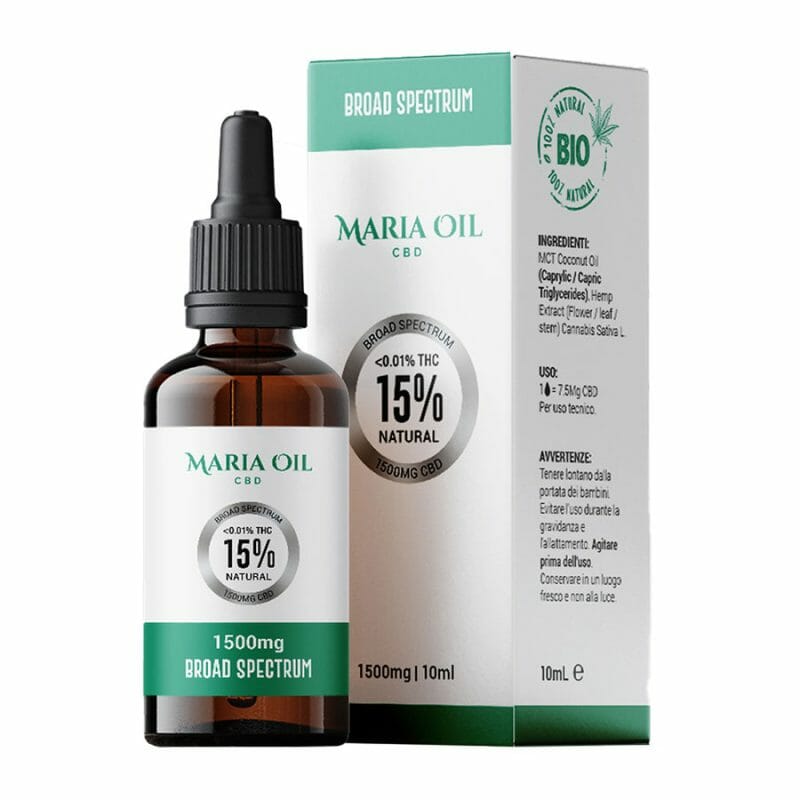 CBD oil 15% (1500mg) Broad SpectrumPrice range: £31.20 through £51.20From 1,71 €/gr
CBD oil 15% (1500mg) Broad SpectrumPrice range: £31.20 through £51.20From 1,71 €/gr -
Product on sale
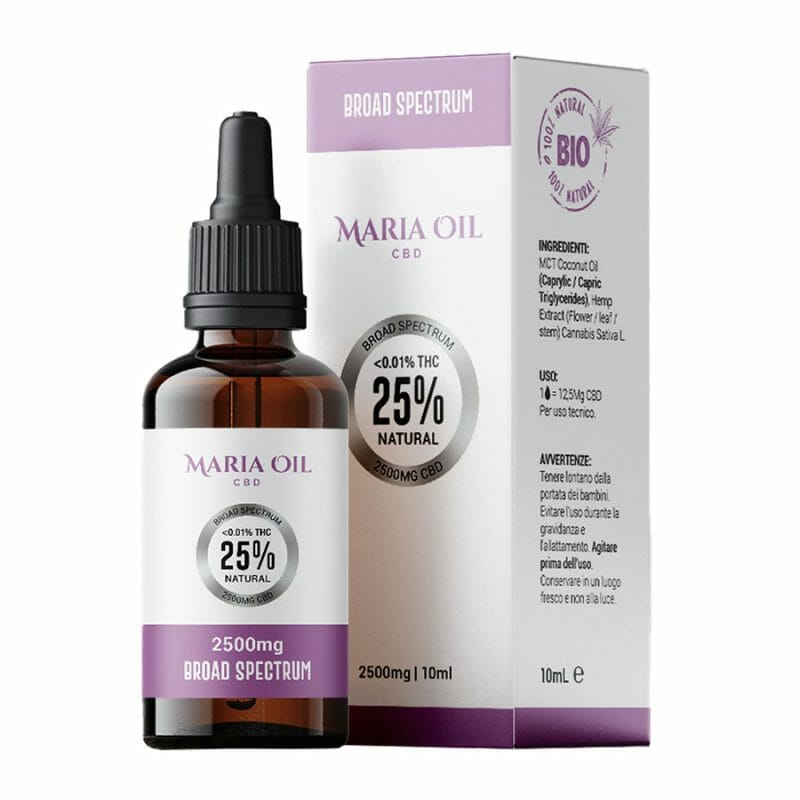 CBD oil 25% (2500mg) Broad SpectrumPrice range: £47.20 through £67.20From 2,24 €/gr
CBD oil 25% (2500mg) Broad SpectrumPrice range: £47.20 through £67.20From 2,24 €/gr -
Product on sale
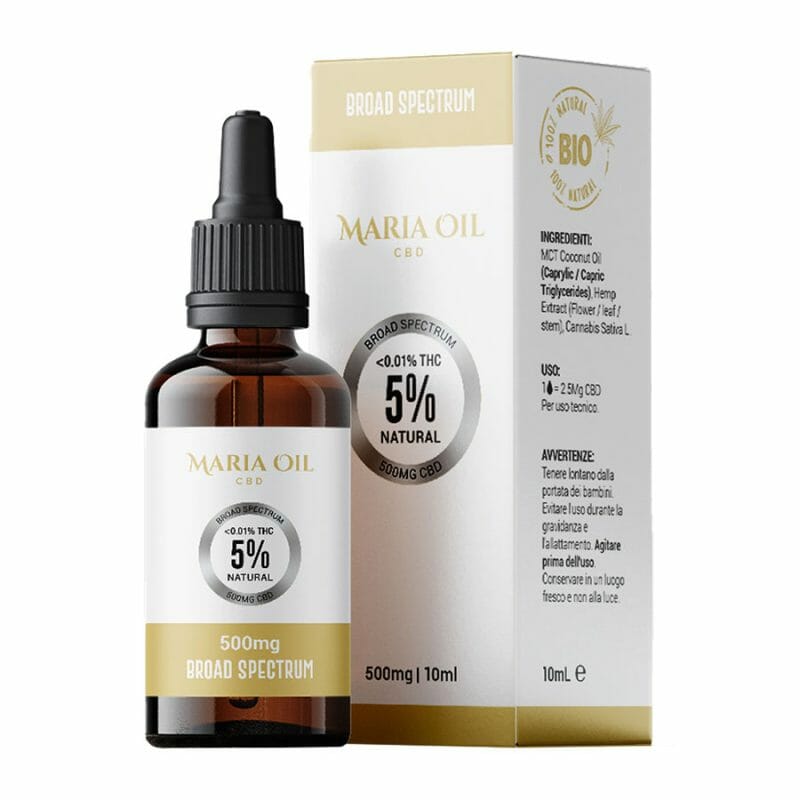 CBD oil 5% (500mg) Broad SpectrumPrice range: £14.25 through £33.00From 1,10 €/gr
CBD oil 5% (500mg) Broad SpectrumPrice range: £14.25 through £33.00From 1,10 €/gr
What is tryptophan?
Tryptophan, also known as L-tryptophan, is an essential amino acid. It is essential because, just like we have already mentioned, it is not directly produced by our body but instead it must be taken in through a diet in which foods that contain it are included.
How does it affect serotonin? Quite simply: when it is taken in, the body turns it into serotonin.
Our body needs even small amounts of tryptophan to increase serotonin levels. This conversion occurs both in the nervous system and directly in the intestines, precisely because amino acids are taken up through food.
In fact, tryptophan has several vital functions for our metabolism and mental and physical well-being:
- It is one of the components of proteins: it is one of the building blocks of proteins so it is indispensable for the growth, repair and maintenance of body structures;
- It is the precursor of serotonin: it is possible to fight anxiety with tryptophan and promote feelings of happiness
- And it is the precursor of niacin: it is a B vitamin that participates in energy production processes at the cellular level and is important for the functioning of the nervous system, the immune system and the skin.
But let’s try to understand what the benefits of tryptophan are and why it is so important for our psychophysical well-being.
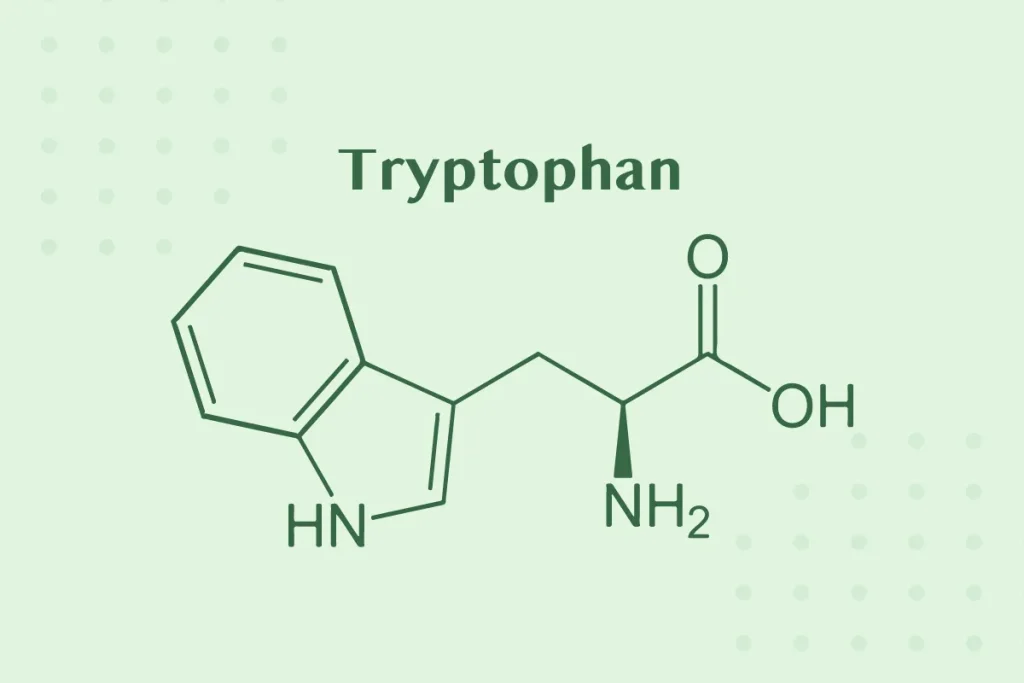
What is tryptophan useful for?
Starting with what tryptophan is, i.e. the precursor of serotonin and melatonin, we derive some main effects:
- Improves mood: the main function of tryptophan is precisely increasing serotonin levels and thereby improving mood;
- It positively influences sleep: a second major effect of tryptophan is on melatonin, the hormone responsible for regulating the sleep-wake cycle.
Tryptophan with melatonin makes it easier to fall asleep and more difficult to wake up (since tryptophan works on the REM phase, where sleep is deepest). Better sleep also helps the mood to be more positive, even treating people suffering from depression; - Improves memory: scientific studies have shown that tryptophan is even able to affect the brain by improving memory;
- Produces more energy: tryptophan is instrumental in the synthesis of niacin, which converts macronutrients (foodstuffs that you take into your body in large quantities and from which you derive your main energy intake) into energy;
- Helps control body weight: thanks to its influence on serotonin, which modulates satiety and reduces cravings for sugar and carbohydrates;
- Improves sports performance: increases resistance to fatigue and concentration.
It is crucial to stimulate serotonin through external sources because most of the serotonin produced by the body comes from the bacteria in the gut. But what is the problem? That it is not able to reach the central nervous system, which is possible thanks to tryptophan.
The process is as follows: after being taken in, tryptophan is converted by the body into serotonin which, in turn, creates melatonin via the pineal gland located in the brain.
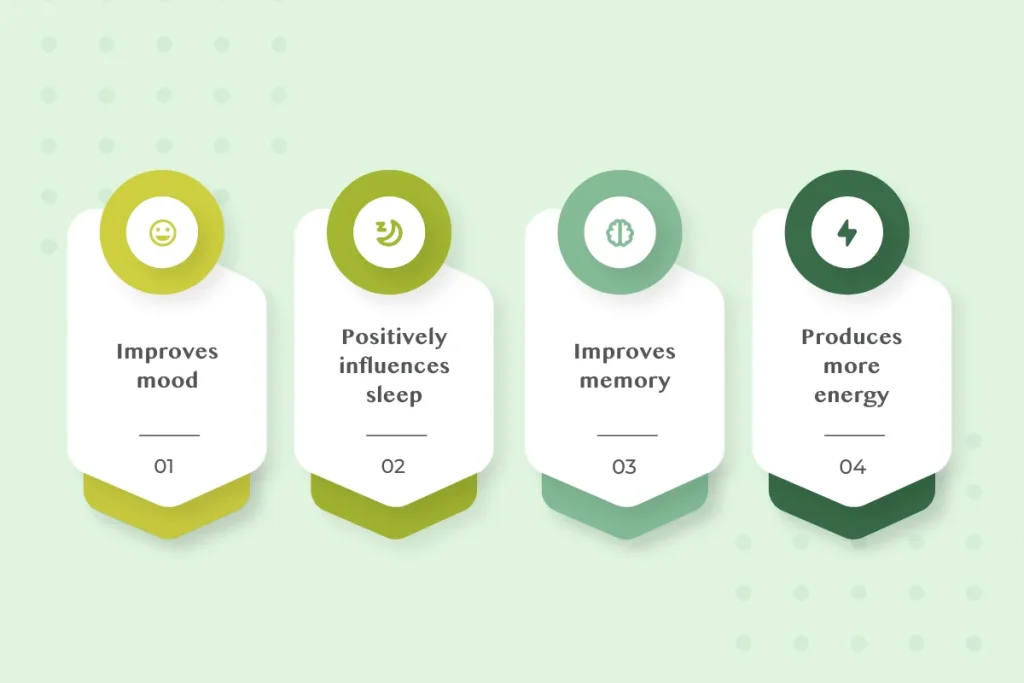
Where tryptophan can be found
To enjoy all benefits of this amino acid, it is essential to know in which food you can find tryptophan.
Tryptophan is mainly found in protein foods, both of animal and plant origin.
Among the foods of animal origin richest in tryptophan are:
- Eggs;
- Milk;
- Meat (chicken, turkey, beef);
- Fish (salmon, tuna, codfish).
Among the foods of plant origin richest in tryptophan are:
- Legumes (raw beans, soy, lentils)
- Dried fruit (dried sweet almonds, hazelnuts, pistachio nuts);
- Seeds (Sesame, sunflower, pumpkin);
- Cereals (spelt, oats, brown rice).
Other foods that contain tryptophan are dark chocolate, cheese, yoghurt, ricotta cheese, spirulina algae and bananas.
Which food contains the most tryptophan? The foods richest in tryptophan per 100 grams are:
- Soy (590 mg);
- Pumpkin seeds (576 mg);
- Parmesan cheese (560 mg);
- Dates (500 mg);
- Dried sweet almonds (394 mg).
If you want to integrate this amino acid into your diet, you should not only concern yourself with the foods that contain it. Obviously, tryptophan is not the only substance they are composed of and other components may affect assimilation.
Instead, bananas, for example, are good for your body in so many ways, including the tryptophan.
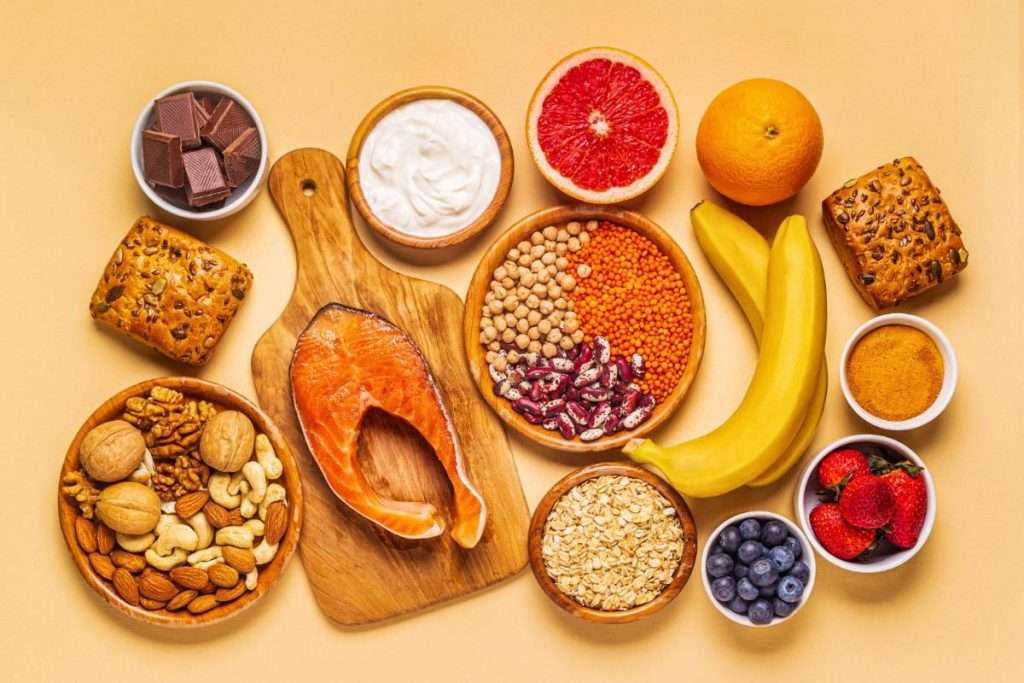
When is it good to take tryptophan?
A varied and balanced diet can ensure an adequate intake of this nutrient in every case, but there are some situations in which it may be useful to supplement it. So there are some cases where it can really make a difference.
Knowing what tryptophan is used for, we can conclude that it is important to take it:
- When suffering insomnia or sleep disorders: tryptophan can help improve the quality and the duration of sleep;
- If you are stressed or depressed: it can contribute to restore optimal levels and counteracts the symptoms of anxiety, depression and irritability;
- If you want to lose weight: it can help you follow a low-calorie diet without starving;
- When practising physical activity: it can help you make the most of your physical and mental potential.
When should you take tryptophan? There is no fixed rule on when to take it. Much depends on why you decided to try the compound.
You can take tryptophan during the day if your intention is to improve mood and memory. If you want to improve physical performance, take it before training. If, on the other hand, you want to try tryptophan to sleep better, you can take it before going to bed.
But be careful because it is not only important when to take it, but also how. You have to take it regularly and consistently if you want to get the long-term benefits. There are also tricks to facilitate absorption, as we will see later.
Tryptophan can be very useful in specific cases, such as for the treatment of insomnia or anxiety, but never try to make diagnoses on your own. A doctor or an expert in the field can give you all the information you need on dosage and the best time to take the compound.
Can supplementing tryptophan in the diet be helpful?
Tryptophan can be taken in through the foods that we listed before or through supplements. In the latter, the concentration of tryptophan is obviously higher and you risk overdosing if you want to overdo it. On the contrary, through a balanced diet it is much easier to assimilate just enough tryptophan to bring back the good mood.
Do not think that the intake of tryptophan from food is insufficient to achieve results. This was demonstrated by research from 2014 on the effects of stress and dietary tryptophan enhancement on alcohol cravings in chronic drinkers. Researchers boosted the level of tryptophan in the diet to see if it could modulate alcohol cravings. In subjects who occasionally consumed too much alcohol, it reduced the need for it, precisely because it reduced the stress from which they were afflicted.
This shows us that a diet designed to increase serotonin levels through the intake of tryptophan can actually give results.
Other ways of supplementing tryptophan naturally
Besides diet, are there other ways to integrate tryptophan naturally into one’s routine?
Here are some simple tips that we would like to give you:
- Introduce tryptophan-based food supplements or similar natural substances, such as CBD, that allows you to get the same positive results, fighting stress, improving sleep and finding psychophysical well-being;
- Combine tryptophan with complex carbohydrate sources such as whole grains, fruit and vegetables to promote the transport of tryptophan to the brain and its conversion into serotonin;
- Avoid consuming too many foods rich in animal proteins, simple sugars and saturated fats as they can hinder absorption and reduce the properties of tryptophan;
- Take B vitamins, magnesium and zinc, which are micronutrients involved in tryptophan metabolism and enhance its action;
- Practise moderate and regular physical activity, as it stimulates the production of endorphins and serotonin, improving mood and mental and physical well-being.
As with any other substance, including natural ones, always remember to incorporate tryptophan into your day gradually and gently accustom your body to it. Don’t take high doses straight away, thinking that you will reach your goal faster. Start with the minimum recommended dose and then gradually increase until you see some change.
-
Product on sale
 CBD oil 15% (1500mg) Broad SpectrumPrice range: £31.20 through £51.20From 1,71 €/gr
CBD oil 15% (1500mg) Broad SpectrumPrice range: £31.20 through £51.20From 1,71 €/gr -
Product on sale
 CBD oil 25% (2500mg) Broad SpectrumPrice range: £47.20 through £67.20From 2,24 €/gr
CBD oil 25% (2500mg) Broad SpectrumPrice range: £47.20 through £67.20From 2,24 €/gr -
Product on sale
 CBD oil 5% (500mg) Broad SpectrumPrice range: £14.25 through £33.00From 1,10 €/gr
CBD oil 5% (500mg) Broad SpectrumPrice range: £14.25 through £33.00From 1,10 €/gr
How many mg of tryptophan can I take in a day?
As with many other substances, there is no single answer. The dosage of tryptophan can vary depending on various factors such as age, weight, diet and state of health.
You can take it every day, in different amounts and in separate doses throughout the day depending on your individual purpose and condition.
The University of Michigan Department of Health has identified recommended daily dosages for:
- Sleep disorders and insomnia: 1,000 to 2,000 mg, with a higher dose during the day and a lower dose before bedtime;
- Chronic pain or migraine: 2,000 to 4,000 mg spread over the day;
- Depression or anxiety: always from a base of 2,000 up to 6,000 mg;
- Treatment of premenstrual syndrome or PMDD: 2,000 to 4,000 mg spread over the day;
- Improving mood: 300 to 1,000 mg daily.
We would again remind you of the importance of consulting your doctor before taking tryptophan. A professional can determine the dosage best suited to your needs and avoid possible side effects or interactions with other medications.
Which are the side effects of tryptophan?
Natural foods are usually the most recommended to avoid contraindications. However, when we talk about potent substances, allergic responses or interactions with other substances may occur.
In general, tryptophan is well tolerated. Numerous scientific tests have now been carried out and no side effects have emerged when the subjects concerned have taken the recommended dose.
However, if it is taken excessively or improperly, the main contraindications are:
- Drowsiness, dizziness and reduced alertness: these are the most common and predictable effects of tryptophan, as it promotes the production of serotonin and melatonin, and can be dangerous for those who have to drive, work or carry out activities that require attention and concentration;
- Nausea, vomiting and diarrhoea: especially if taken on an empty stomach or in high doses, tryptophan can irritate the gastric and intestinal mucosa, causing digestive disorders and malabsorption;
- Headache, migraine and hypertension: these are the rarer but more serious effects of tryptophan due to its ability to increase blood pressure and cause vasoconstriction, as tryptophan can also stimulate serotonin production in the cerebral arteries causing headaches, migraine and hypertension;
- Serotonergic syndrome: this is a life-threatening condition that occurs when serotonin levels in the brain become too high, due to an overdose of tryptophan or an interaction with other drugs or supplements that increase serotonin (such as antidepressants, anxiolytics, antihistamines, herbs such as ginkgo biloba or ginseng).
It is also important to know after how long tryptophan takes effect in order to avoid overdoing it: the time varies from person to person, but in general one should feel the first antidepressant effects after about 3 weeks of regular intake, while just one dose is enough to improve sleep quality.
Who should not take tryptophan?
Can everyone take tryptophan without risk? Given the powerful effects of this amino acid, there are certain categories of people who should limit their use of it, if not to say avoid it altogether.
It should not be taken by those who:
- Suffers from severe liver or kidney disease, because their bodies are unable to metabolise and eliminate tryptophan properly;
- Are pregnant or breastfeeding, because there are insufficient studies on the safety of tryptophan in these conditions;
- Has eosinophilia-mialgia syndrome, a rare disease that causes inflammation and muscle pain and has been associated with the intake of contaminated tryptophan;
- Taking antidepressants, antipsychotics, anti-anxiety drugs or others that affect serotonin levels, because tryptophan could potentiate their effects and cause a serotonergic syndrome.
For all these reasons, it is always advisable to consult your doctor or pharmacist before taking tryptophan to assess the need, dosage and duration of treatment.
-
Product on sale
 CBD oil 15% (1500mg) Broad SpectrumPrice range: £31.20 through £51.20From 1,71 €/gr
CBD oil 15% (1500mg) Broad SpectrumPrice range: £31.20 through £51.20From 1,71 €/gr -
Product on sale
 CBD oil 25% (2500mg) Broad SpectrumPrice range: £47.20 through £67.20From 2,24 €/gr
CBD oil 25% (2500mg) Broad SpectrumPrice range: £47.20 through £67.20From 2,24 €/gr -
Product on sale
 CBD oil 5% (500mg) Broad SpectrumPrice range: £14.25 through £33.00From 1,10 €/gr
CBD oil 5% (500mg) Broad SpectrumPrice range: £14.25 through £33.00From 1,10 €/gr
The relation between tryptophan and CBD
Like tryptophan, other natural substances are also capable of increasing serotonin levels and restoring good mood: these include cannabinoids, found in the hemp plant.
Cannabinoids, specifically CBD and THC, affect serotonin levels because they interact with the endocannabinoid system present in the central and peripheral nervous system. The endocannabinoid system regulates many functions of the body such as appetite, sleep and, of course, mood.
Particularly effective are products where CBD, hemp’s most important active ingredient, is combined with Tetrahydrocannabinol (or THC). Indeed, the latter interacts with the CB1 receptors in the system responsible for the activation of so-called serotonergic neurons. It is from these neurons, present in the central nervous system and the gastrointestinal tract, that serotonin is synthesised.
Numerous scientific studies have tested CBD products in the treatment of anxiety, stress and depression. The results have been so encouraging that they make them a viable natural alternative to anxiolytic and antidepressant drugs. Not least because CBD solves the problem at its source, unlike traditional drugs, and does so without causing addiction or dependence.
When CBD is combined with THC and all the other natural substances present in the hemp plant, the so-called ‘entourage effect‘ takes place. The properties of all these substances, and in particular the benefits of CBD, are amplified precisely because of their working in synergy.
Supplements that fulfil the functions of tryptophan
A balanced diet can be combined with the wise use of natural supplements, ideal for treating ailments you suffer from or simply to help you stay healthy and thus prevent future illnesses.
Natural supplements are generally safer than traditional drugs, although you should always pay attention to the correct dosage and how to use them.
There are various CBD products available on the market, each with its own way of taking them. For instance, CBD oil can be added to hot or cold drinks, or it can be taken directly under the tongue. There are also ready-made CBD teas, CBD candies and other products that can be used for various purposes, such as pain relief or stress reduction.
If you are interested in cannabidiol, we invite you to discover Maria CBD Oil’s products including oils, herbal teas, candies and much more.
Visit our online shop where you will find our complete range of CBD products and choose the one that best suits your needs.
 Contact us
Contact us 






